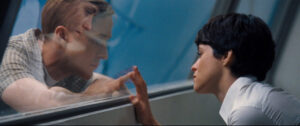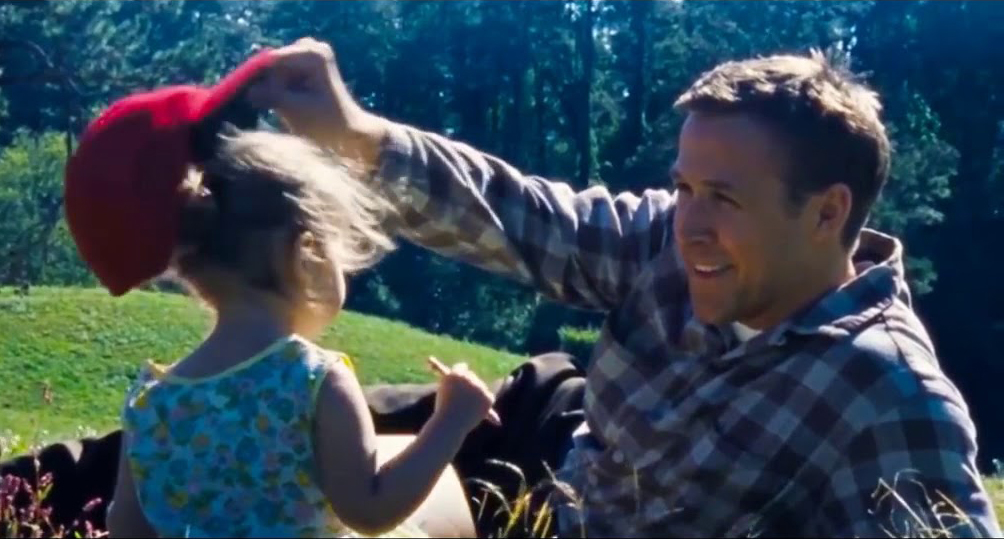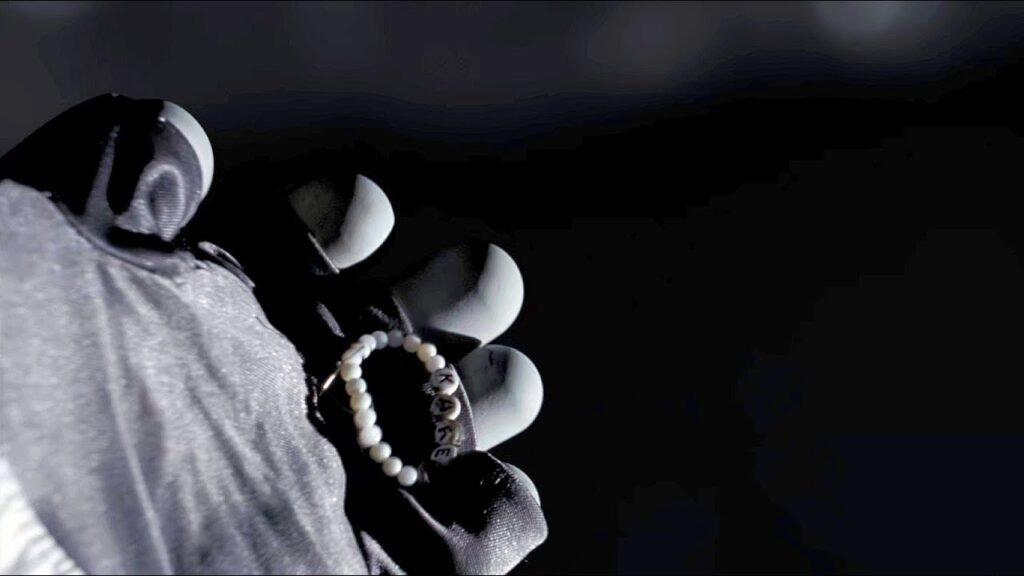As you’re probably aware, the space community is very excited at the moment as both NASA and Space-X have confirmed plans to get people back to the moon in the next few years. The last time men stepped on the moon was on the Apollo 17 mission in 1972. It’s been a whopping 50(!) years since we’ve been that far out in space. Regardless of the reasoning for this new inspiration, there’s an invigorated spirit in the air around space exploration and how modern technology can augment what the Apollo missions accomplished.
This new era of manned space missions to the moon is exhilarating on its on own, but it also has me reflecting on my favorite film of 2018 – Damien Chazelle’s masterwork First Man. Specifically, I’ve been reminiscing about that first watch and how it left me flabbergasted. Leading up to its release, the marketing for the film (rightly) sold it as a story about Neil Armstrong going to the moon and achieving a feat that seemed impossible. A man walking on the moon. A milestone in humanity that’s easily at the top of the “holy shit, can you believe we did that?” pyramid. Additionally, as we all know by now, the process in getting Neil and Buzz Aldrin to the moon was arduous. The crew was constantly working long hours, putting a strain on relationships and families. Technology needed to be developed, which didn’t always go according to plan. There were even casualties along the way, sadly. However, those deaths and the extreme stress put on the crew was not in vein. In July of 1969, Apollo 11 went to the moon and Neil Armstrong made history by being the first person to ever step foot on the moon. What a movie, right?
Except that’s not at all what First Man is about. The opening shot of the film is Neil playing with his young daughter, Karen, whom we’ve come to find out is dying as a result of cancer. It was an emotional wallop that I never expected. As that opening sequence comes to an end, there’s a blistering shot of Neil putting his daughter’s bracelet in a drawer, which is phenomenal symbolism of Neil doing the same thing with his emotions. He locks them away and becomes a shell of himself. It’s at that point where we come to realize that First Man isn’t about Neil going to the moon at all.
Throughout the film, we see Neil bury himself in his work. He’s wholly committed to the Apollo project. He’s one of NASA’s very best pilots. He’s smart and intuitive. There’s never a second that goes by where we question his devotion to the cause. In fact, he’s almost exclusively steadfast in his mission. As a result, much of what is sold in the marketing comes to fruition. We see the challenges that NASA experienced in getting Apollo to the moon. We see how taxing it is on everyone. This level of math and science has never been attempted before. In one of the film’s most thrilling scenes, we see Neil orbit the earth and nearly lose his life in the process. If not for his ingenuity and elite piloting skills, it may have ended there for him. Regardless of the hurdles though, he remains deeply focused on what’s in front of him. Some might argue that this is to his detriment as his relationships with his wife and sons are becoming strained. And not just because he’s away from home often, but because he’s incessantly stoic.
The truth about First Man, and the brilliance of its sleight of hand, is that at its core it’s about a father attempting to grieve. Losing a child is unfathomable, and there’s no telling how someone will respond, but for Neil it made him distant. He struggled in his day-to-day (as many of us probably would). Again, he had locked his emotions away with the bracelet. He stayed busy to keep his mind off of his grief, which evidently worked because there are a few scenes in the middle of the film in which we see Neil at home and he envisions Karen in their lives still. It’s a great reminder to the audience that he’s still thinking of her, still grieving for her. We quickly realize that his work and grief are intimately linked, and, in that way, First Man gets to have its cake and eat it too. As a framing device, the Apollo 11 mission itself is compelling and there’s lots of drama to be had. However, from Neil’s perspective, his experience inside the mission is coming from a place of anguish and personal suffering.
Getting to the moon wasn’t about beating the Russians. It wasn’t about politics or science. It wasn’t about achieving some sort of historical legacy. For Neil, it was his way of getting closure. For Neil it was about healing and saying goodbye. Neil went all the way to moon…to grieve. Which is exactly why, as Neil and Buzz get to the moon, there’s no tension or drama. Chazelle doesn’t emphasize, in any way, the specifics of the mission and what they are supposed to be doing. No, most of the sequence involves close-ups on Neil looking into the distance. Reflecting. Grieving. Saying his goodbyes. In a very tangible way. We see Neil approach the crater and pull something out of his pocket. It’s his daughter’s bracelet. Once again leaving me gobsmacked. But it makes complete sense. After locking away his emotions all this time, along with the bracelet, this is the first moment where he’s dealing with his pain. A simple gesture flooded me with emotions that’s hard to articulate. An incredible moment heightened by Justin Hurwitz’ incredibly underrated score (his best work to date) and extraordinary in its emotional currency.
There’s something truly profound about the idea that sometimes we have to go to extreme lengths for healing and closure. For mankind, going to the moon is literally as far as one has gone. It’s an achievement that will forever go down in the history books. And Neil was desperate to get there. It meant everything to him. Every choice Neil makes throughout the film compliments its drama and overarching story, but allegorically it’s astoundingly potent and personal.
 It’s also what renders the final shot of the film between Neil and Janet equally beautiful. There was a distinctive gap in their relationship as Neil buried himself in his work. He worked long hours, the missions were always dangerous, and even when he was home he was emotionally closed off. Yet, after his moment on the moon and getting the closure he needed, he was able to finally connect with her in some small way. Separated by glass, but another gesture comes into play as he reaches out to her. She reaches back. Perhaps symbolically there may be something in between them still, but for the first time in the film there’s hope.
It’s also what renders the final shot of the film between Neil and Janet equally beautiful. There was a distinctive gap in their relationship as Neil buried himself in his work. He worked long hours, the missions were always dangerous, and even when he was home he was emotionally closed off. Yet, after his moment on the moon and getting the closure he needed, he was able to finally connect with her in some small way. Separated by glass, but another gesture comes into play as he reaches out to her. She reaches back. Perhaps symbolically there may be something in between them still, but for the first time in the film there’s hope.
There is a lot to love about First Man in terms of its direction and cinematography. Its set designs and overall aesthetic is immersive to the time period. Its score and sound design is phenomenal. And Ryan Gosling gives arguably the best performance of his career. The stoicism and quiet emotion he brings to Neil is truly magical. Along with Chazelle and writer Josh Singer, he is one of the major reasons as to why the film’s sleight of hand is so affecting. The craft on display in this film is masterful, and given the talent involved that wasn’t too shocking, but to frame mankind’s largest accomplishment as a smaller, intimate portrayal of humanity? I did not see that coming at all. Perhaps part of it is timing. In October of 2018, my son was three (about to turn four), which is about the same age we see Karen in the film. It was really difficult to separate myself from the movie. So maybe I’m biased, but First Man‘s sleight of hand hit me like a sledgehammer. Going to the moon to grieve. It’s an experience I’ll soon not forget.







